By Awtar Singh
LOS ANGELES: When the Partition of India happened, I was 20 years old and our family lived in Lyallpur (now Faisalabad) where my father was a rich contractor-cum-brick kiln owner.
The events of 1947 are vividly etched in my mind. I had just got back home in Lyallpur from Lahore Engineering College when all hell broke loose. We believed the political storm would blow over, and everyone would be able return to the new country of Pakistan as a minority. It would be not much different than how we lived in Colonial India, and we had lived well under those conditions. Lyallpur had been a very stable and calm place, and it remained calm even as the initial Partition violence raged on outside the city’s limits. Thinking it was only for safety, my father shipped my mother, sister, and younger brother to an aunt’s on the east side of the new border. She lived in Amritsar, and after the division it had gone to India.
We were optimistic for our future in Pakistan. We thought that our family’s separation would be only a temporary precaution. Father and I stayed back hoping that the violence would end. Sikhs were about three percent of the population in the whole country, and my father was financially very sound in Lyallpur. He did not want to move out. He said, “Sikhs are to be a minority whether in India or in Pakistan. I have my wealth in Pakistan, so I am here to stay as part of minority.”
So we tried to stay and even went to the city hall to salute the Pakistan flag on August 14, 1947, when it was hoisted for the first time. However, more and more killing began and ethnic violence became the rule, not the exception. At the point of a gun, people were leaving their homes and homeland to run across the new border. Millions moved, and a million were killed; many others were raped and looted, and women became especially susceptible to violence. Rioting also became common. At this time, I was twenty, a freedom lover wearing khadi as a symbol of simplicity and defiance. Hindus, Sikhs and Muslims who had lived in harmony for generations – including my best friend Hanif – were overtaken by a religious frenzy. Everything was turned upside down. Soon, the killing came closer and closer to Lyallpur. What came to be known as ‘ghost trains’, they shipped train cars full of severed limbs and bodies from Pakistan to India and India to Pakistan. Military escorts became the only safe way to travel across the border and reunite with other refugees and family. My father had a bank account fifty miles away from town, but he didn’t have the means of safety to go and cash his bank account.
On September 10, 1947, an Indian military convoy arrived in Lyallpur, and my father and I were forced to leave. We were escorted with the rest of those who had tried to remain across the new border. We left with just a few of our belongings and almost none of our family’s assets. Our beautiful house was no longer ours. A couple of suitcases, and a small amount of cash was all we could take with us.
Under normal conditions, the journey from Pakistan to India would only have taken a few hours. But the journey in this caravan took several days. As it traveled, the caravan was attacked, but it suffered very few casualties. Our camping spots were completely unhealthy and food was scarce. After many scares and close calls, we made it to the Indian border and went straight to my father’s sister’s house, which was already overcrowded and full of refugee relatives. Still, we were safe and able to join the rest of our immediate family.
In the days before our arrival, Iqbal (my younger brother) had come to the border everyday to see trainloads of living and dead bodies going across the border. People came in buses, trucks, trains. Iqbal was looking for us when any caravan crossed the border. He was not sure if father or I were living or dead.
Now that we were all safe on the Indian side of the new border, we slept on my aunt’s floor while the killings continued to go on outside. The horror stories of slaughtered human beings being shipped across the border in train stories still filled our minds. Many refugees had to be accommodated in refugee camps, because they had no ties on the Indian side. We were very thankful to my aunt for not having to be in these camps.
From my aunt’s home in Amritsar, my family moved to Basti Guzan to settle in Jalandhar where we began to rebuild our shattered lives. We found and moved into a small house in our new town that had been vacated by a Muslim family fleeing India the same way we had fled from Pakistan. I remember vividly walking into that new home and finding a piece of bread lying on the table. It struck me that the same kind of tragedy was occurring on both sides of the borders. One got an eerie, painful feeling walking into an empty home left by a family on the run. Clothes were left in old beat-up trunks. Jewelry was abandoned in boxes. Chairs and cots were scattered across the floor. We had no idea how many people had lived there, what age group they were, if they were killed, or if they had simply run away. We had no idea however, we now had a home.
(The Los Angeles-based late Awtar Singh was among the engineers who built Bhakra Dam. He moved to the US in 1962 and later created first Indian fellowship at UC Berkeley. His memories of Partition appear in his autobiography titled Driftwood. This article first apeared on August 14, 2014.)

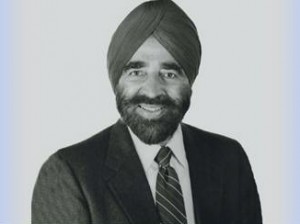


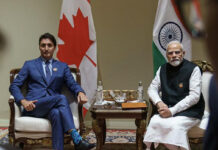
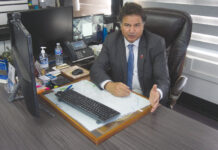
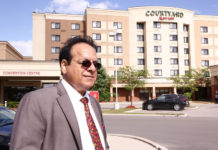
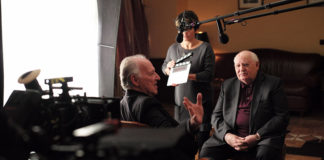
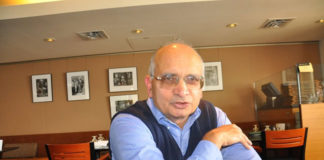
Sat sri akal sir. And my great great grand father was from layallpur.they were also renowned builders. By any chance do you know S.Dhanna singh layal.
Gurpreet Kaur ji, I have no idea about Kirpal Singh Sandhu. One master Kirpal Singh of village Gondran wala was our English teacher and we never met after partition.
Randhir Virdi
It’s an impressive personal account of times of partition. My father and a few of his contemporaries worked in Lyallpur in pre-partition times. One of my best friend’s family in Delhi came from Pakistan too and built an enviable future in India after struggling though many a hardships. None of their family members talked about their departure from Pakistan or where they cam from, perhaps it was too painful. In my younger days I heard many people referring to the Sikhs who came from Pakistan as Bhape. For a long time I thought it simply meant brother. But it had another meaning in the minds of the people who believe of segregation of one kind or another. Your story is thought provoking and appears to have an aspiration of peace in the world.
Like · Reply · 2 · 4y
Subodh Mathur
Please write your family story for http://www.indiaofthepast.org, which aims to cpature personal memories of Indians that are at least 50 years old. Subodh Mathur, editor scmathur@gmail.com
Like · Reply · 2y
Tahir Iqbal
I lived in Lyallpur, My Nana came from Tanda road, Jalandhar (India) & Dada from Chahar Bagh Jalandhar. Same story, same tragedy, God bless us all. It is very painful & difficult to comment on Punjab Partition of 1947.
Like · Reply · 3y
Tahir Iqbal
dear Awtar Singh Sahib, Can you tell me where you lived in Lyallpur before partition. I Posted many pictures of old houses of pre partition 1947 of Hindu & Sikh families at my flickr account.
Like · Reply · 3y · Edited
Devinder Mand
I was 13 years old my father S.Lachhman Singh was in Lyalpur working in Irrigation Department Lyalpur, but in June 1947 transferred to Lahore, we lived in Janak Nagar close to Multan road. Luckily my brother from Okara (Montgomery Dist) made the family to Ludhiana. Me Devinder Singh Mand now living in Lake Forest CA 92630
Like · Reply · 3y
Balbir Momi
I was 12/13 years old in 1947 and student of 8 grade in village Khalsa High School Nawan Pind, Chak no. 78, Tehsil & Distt. Sheikhupura. Nearer Railway Station was Mandi Dhaban Singh and Police Station Sangla Hill. Sacha Sauda was 3rd Railway Station from Mandi Dhaban Singh towards Mandi Chuharkana where Guru Nanak bought grocery for hungry ‘sadhus.’ I used to attend massia mela at gurdwara Sacha Sauda every month with my parents and also visit Nankana Sahib which was about 16 miles from our village. I was deeply pained with partition and stay in Sacha Sauda refugee camp with my parents for a month in September 1947 where there wsa no food to survive and to sleep on bare ground. There were more than million Sikhs and Hindus in ths Sacha Sauda camp. The life was very miserable and hard to have accommodation in over crowed trains and buses. The train we got to reach India, stay at Sheikhupura and then in Lahore stations for longer hours where we supposed to be killed. All belongings were snached by force by police and military at Sheikhupura railway station. Lookig death very near water and food, it took 20 hours to reach at a refugee camp near Ferozepur cantt. Rehablitation was more miserable moving place to place to settle in Indian Punjab. It took 14 years to get pakki allotment of land we left in Pakistan. I am 81 now but never forget the partition. I have written many short stories and novel “Peela Gulab” at partition. Althoug I have visited Pakistan many times specially my village, my home, Lahore, Sheikhupura, Jandiala Sher Khan, the birth place of poet Waris Shah, Panja Sahib, Islamabad, University of Gujrat etc., officially and non officially. My books are pubished in Shahmukhi in Lahore and my autobiography “Kiho Jiha Se Jeewan” is Published in Lahore by “Sanjh” publishers, 2nd part being released soon in Lahore. As a Canadian Punjabi writer living in Toronto, I am read both in India and Pakistan. My contact no. is 416-949-0706. Why I do not forget my early days of life now in Pakistan.
Like · Reply · 2y
Gurpreet Kaur
hello Sir,
did you ever come across Mr Kirpal Singh Sandhu during your schooling days?
Like · Reply · 1y
Asif Ali
Assalam-O-Alikum Everyone am Asif Ali and live in Faisalabad,Pakistan. My Grandfather migrate Amritsar ( Tarn Tarn) to Faisalabad,Pakistan and my Grandmother migrate Haryana to Faisalabad,Pakistan but lucky she is alive now at the age of 77 years old. She tell me about partition painful stories and divided of Punjab into parts.
Like · Reply · 1y
Asif Ali
If anyone want to ask me any Questions or memories of Lyallpur ( Faisalabad,Pakistan) than freely contact me at asifali3594@gmail.com
Like · Reply · 1y
HI,ANYONE HERE FROM DHOLANWAL HOSHIYARPUR?
THX
I read the story of Mr.Singh it was heart touching. The organised killing of Innocent muslims, sikhs and hindus in Punjab is a terrific and horrible chapter of our history. Faisal abad was a strong hub of hindus and sikhs entrepreneurs. Where as muslims are in majority. I will never forget the killing of innocent muslims in east punjab and sikhs + hindus in west punjab. I pray to Al-Mighty Allah never these types of communal riots took place. Ameen.
Awtar Singh ji, do you by any chance know Sardar Tirath Singh Madan who was the Chief Engineer for the Bhakra Dam. My grandmother Gian Kaur also hailed from Kharbanda family of Lyallpur.
My comments are given as above. But I may mention that I email address which was auto generated has ceased to function as I have forgotten my pass word. My new e mail address is given below which is very much operational. singhharjagjeet@yahoo.co.in
JAGJIT SINGH
Though I do not come from Layallpur, our story of migration to India is very much the same as referred to in the article. I was nine year old at the time of Partition and was a member of a large family with my parents, eight brothers and sisters and one sister in law – the wife of my eldest brother. We belonged to village Channomom in District and Tehsil Sialkot. My father and eldest brother were running a cloth shop in Sialkote city. Our village was just at distance about 3 miles from the city. As such they were daily going and coming back from the city. My elder brothers were also going to a city school but I was studying in a govt. primary school in our village. Our father along with one of his friend rented a room in Udhampur Kashmir and we shifted there for a period of just one month with an intention to go back to our home after the position stabilized. But as we reached Udhampur on perhaps 9th August, news about the mass scale killings started reaching us. Our uncle’s ( taaya ji) family comprising of uncle and aunt, his two sons and their wives were killed (with three unmarried girls spared by a God-oriented Mohammden and were later got evacuated by us with the military help. Our maternal uncle’s son – a leading advocate of Gujranwala was murdered at Rly staion, Our Bua Ji’s both the sons were killed in Sialkot and many more such killings as known and related families came to light. We became refugees and settled in Delhi. Though born at the sixth place in my family now i am the eldest running in 79th year, with all the elders having left this mortal world.
Jagjit Singh s/0 S. Amar Singh and younger brother of S. Gurdial Singh residing at 372, Guru Harkrishan Nagar, new Delhi 87 harjagjeet@yahoo.co.in
We are from village kalas near mukerian dist hoshiarpur.
Same story same rout from hoshiarpur to lyallpur.
May be some more disperation
Similarly, during riots in Indian Punjab, Muslim men were unpitifully killed and women were tortured and raped by Sikhs and Hindu mobs. They didn’t even spare little kids and played Holi with their blood. Muslim women who were kidnapped by Sikhs were forcefully converted into Sikhnis. There are so many such tragic incidents occurred in Punjab and Bengal especially.
my father munshi ram popli s/o sh.ram chander popli s/o sh. chhatta ram popli was 3 year old in 1947 and migrated to india from village sarwarwali ,tehsil jarawalan, distt.lyallpur
I have vague memories of chak 238 near then lyallpur as told by our father. can any one confirm.
my grand father was S Mehtab singh dua and father Dr Gursaran singh.
japsimran singh. : S jawahar singh S piar singh were well known merchants of then Lyallpur as corroborated by my grandfather .
I am a writer…wish to write on situation of villages like chitti 90 and 93 in dist Lyallpur or nearby….i shall be highly obliged if any information about that area is referred or provided to me.
I will mention in the acknowledgement if permitted…
Aslaam o aliqum
sir,
My name is Mateen Ullah Khan. I am from Faisalabad village 84 GB foajpur.My friend from 93 Chitti.its the village situated Faisalabad to Lahore Road.Main road stop is 61 chak.
Mateenullah1@gmail.com
Hi Mateen,
My grandmother s family moved from 93 Chitti Faislabad to Jalandhar.
Father of grandmother was a renowned Hakeem in that area.
Thanks,
Mr: Mateen Ullah Khan:
My grandfather and father lived in Chak No. 82 and I was born there in 1937. Pleasure to know a past next-door neighbor.
Thanks
90 chitti and 93 is near shahkot town. Now tehsil of dist nankana sahib. It is near industrial area now
Dear my name is Salman and I’m working in textile organization mary colleagues in villages say stay han 93 and 90 chiti these villages near gujjar sing village
Rajesh my name is salman I also lived in layallpur now Faisalabad app nay tu dil khus ker dia rail bazar ka naam lay ker ajj b yahan jewellery ka bazar ha aur ma roz is I bazar say guzarta hun an yahan property booooht costly ho chuki ha mandir wali gali air rail bazar ma
I’m from Faisalabad mera college 93 chiti say ata ha ma aik textile organization ma job kerta hun near 93 chiti village
Do you have any information on Chak 93 chitti sir?
Dear Rajesh ji,
My Dadi was daughter of Shri Nanak Chand Saraf of Lyallpur. Her name was Smt Vishwavati Kapoor. Her brothers Shri Kedar Nath, Shri Badri Nath and Shri Amar Nath. Good to see a large family tree. Let’s unite.
Mr Ritesh Kapoor, Rajesh Seth’s email is: seth19955@gmail.com
Sir,
I have the read the article and found it is very touching and impressive
My name is Rajesh Seth, residing at Jalandhar.
My father was born and brought up at Lyallpur. His name Sh Prithvi Nath Seth, my taya ji Sh Raghu Nath Seth, chacha ji Sh Som Nath Seth all born at Lyallpur. My father was a student of Government College, Lyallpur at the time of partition.
My dadaji Sh Bhawani Dass and his brothers Sh Nanak Chand, Sh Sita Ram had joint jewellery business. The name of the shop was ” Nanak Chand Dhanpat Mal Saraf” , in Rail Bazar. They resided at Mandir wali Gali. One of my dadaji’s brother Sh Sunder Das was an officer in the railway.
I lived in Lyallpur 1942 to 1947 – studied in Khalsa High School up to 3rd class. My teachers were Nather Shah Singh & Arjun Shas Singh. My Father S. Lachhman Singh was working in the Irrigation Department. Four Months before partition, we moved to Lahore, and lived in Janak Nagar (Multan Road).
Sir mandarwali gali is now cloth market and very busy markt
HI,
RAIL BAZAR IS A MAIN GOLD MARKEET IN LYALLPUR NOW,APOX ALL THE LONG BAZAR IS A JWELLRY SHOPS AND GOLD KARKHANAS.THE WORST DID BY PAKISTANI GOVT,
CHANGED THE NAME OF THE CITY, LYALLPUR HAS HISTORY,
THX TO MR.J.B,LYALL.
Sir
By any chance did you know S.Piar Singh & S. Jawahar Singh
I lived in Lyallpur from 1971 to 1977. The ghosts of the Hindu and Sikh families are everywhere. Library books bearing names of long exiled sons to the ‘OM’signs on homes with new occupants.
Some Muslims I spoke to were reduced to tears as they spoke of Hindu and Sikhs they left in India never to see again.
Partition was a tragedy and a parting kiss from the British who wanted to make a mess of the country before they left.
dear awtar singh
i am conducting research on Lyallpur on violence,migration and rehabilitation. so if you mail me details of these incidents.
I live in the United States and grew up listening stories of the clock tower in Lyallpur living in Delhi. I learned that Lyallpur was 87 miles from Lahore and the common man traveled in horse carriages. My Bhuaji (dad’s sister ) now 91 years old living in Toronto used to live in Quetta. She would board Frontier Express ( name changed to Golden Temple mail in 2004 with Amritsar as the last stop) from Lahore for return from her parents house in Lyallpur to Queta, her home after marriage. My Father now 84 years old traveled to Mata Vaishow Devi for the first time in 1943. That was the furthest he got into the indipendent India’s side. The stories of past we’re rarely shared and I admire that many refugees looked up to the future. I moved to the United States, uprooted myself from the life in New Delhi. The difference is that my migration was the choice, whereas the previous had to uproot themselves without a choice. Unfortunately there is no museum or some display of memories that the future generation could remember. I regret that an ancient civilization was redrawn on the lines of two religions.
Sir, my father was born in sangla hill dist shekhupura in Pakistan my grandpa was goldsmith there my father used to go to layallpur to purchase gold from there
Hi deepak. Our family was from sangla hill as well. Would love to connect.
There was a family of Mistry AmarSingh Thekedar.Who remained there in lyallpur but he sent his family to India in 47.kindly .